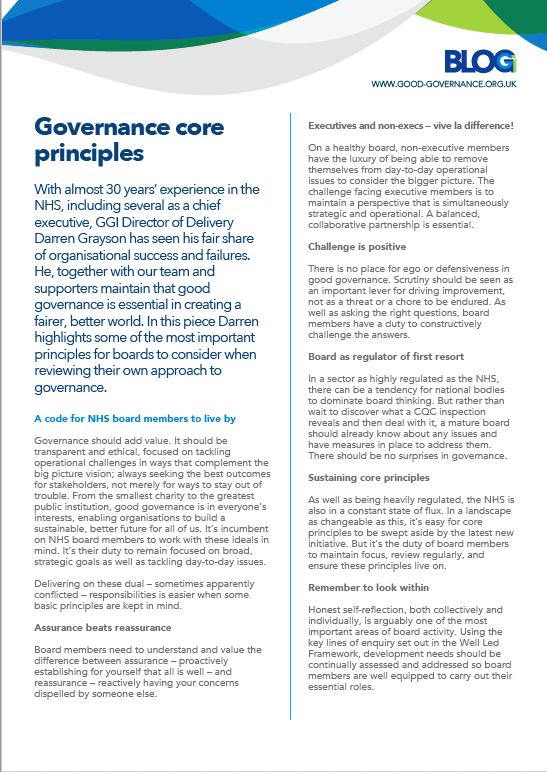Governance core principles
24 July 2019

With almost 30 years’ experience in the NHS, including several as a chief executive, GGI Director of Delivery Darren Grayson has seen his fair share of organisational success and failures. He, together with our team and supporters maintain that good governance is essential in creating a fairer, better world. In this piece Darren highlights some of the most important principles for boards to consider when reviewing their own approach to governance.
A code for NHS board members to live by
Governance should add value. It should be transparent and ethical, and focused on tackling operational challenges in ways that complement the big picture vision. Governance should always seek the best outcomes for stakeholders and not merely be a way of staying out of trouble. From the smallest charity to the greatest public institution, good governance is in everyone’s interests. It enables organisations to build a sustainable, better future for all of us. It's the duty of NHS board members to remain focused on broad, strategic goals while tackling day-to-day issues and meeting their responsibilities so it's incumbent on them to work with certain governance ideals in mind.
Assurance beats reassurance
Board members need to understand and value the difference between assurance – proactively establishing for yourself that all is well – and reassurance – reactively having your concerns dispelled by someone else.
Executives and non-execs – vive la difference!
On a healthy board, non-executive members have the luxury of being able to remove themselves from day-to-day operational issues. This would offer them the time and space to consider the bigger picture. The challenge facing executive members is to maintain a perspective that is simultaneously strategic and operational, and at the same time, a balanced, collaborative partnership is essential.
Challenge is positive
There is no place for ego or defensiveness in good governance. Scrutiny should not be viewed as a threat or a chore to be endured but rather an important lever for driving improvement. Board members have a duty to ask the right questions, as well as constructively challenge the answers.
Board as regulator of first resort
There also should not be any surprises in governance. In a sector as highly regulated as the NHS, there can be a tendency for national bodies to dominate board thinking rather than waiting to discover what a CQC inspection reveals and only then dealing with it. A mature board should already be aware of any issues so to have measures in place to address them.
Sustaining core principles
In addition to being heavily regulated, the NHS is also in a constant state of flux. In a landscape as changeable as this, it's easy for core principles to be swept aside by the latest new initiative. Again, it's essential for board members to maintain focus, review regularly and ensure good governance principles live on.
Remember to look within
Honest self-reflection, both collectively and individually, is arguably one of the most important areas of board activity. Using the key lines of enquiry set out in the Well Led Framework, development needs should be continually assessed and addressed so board members are well equipped to carry out their essential roles.

